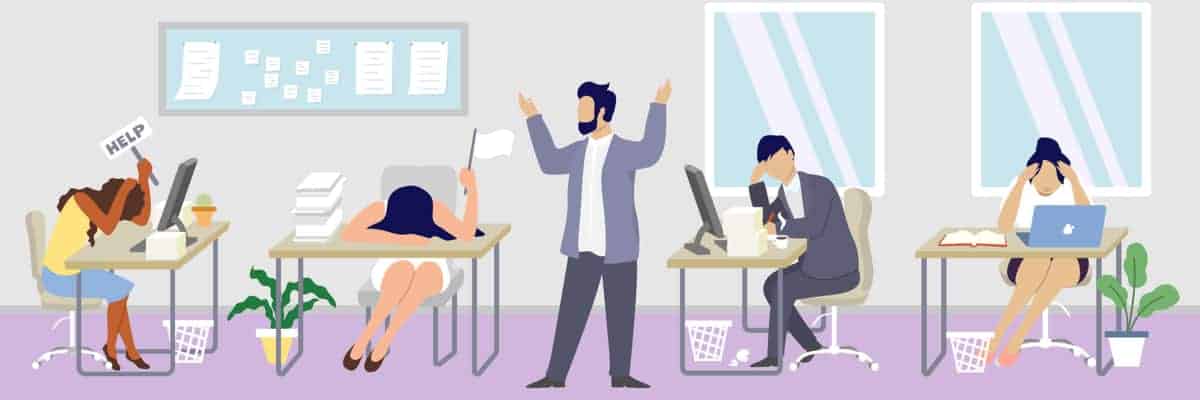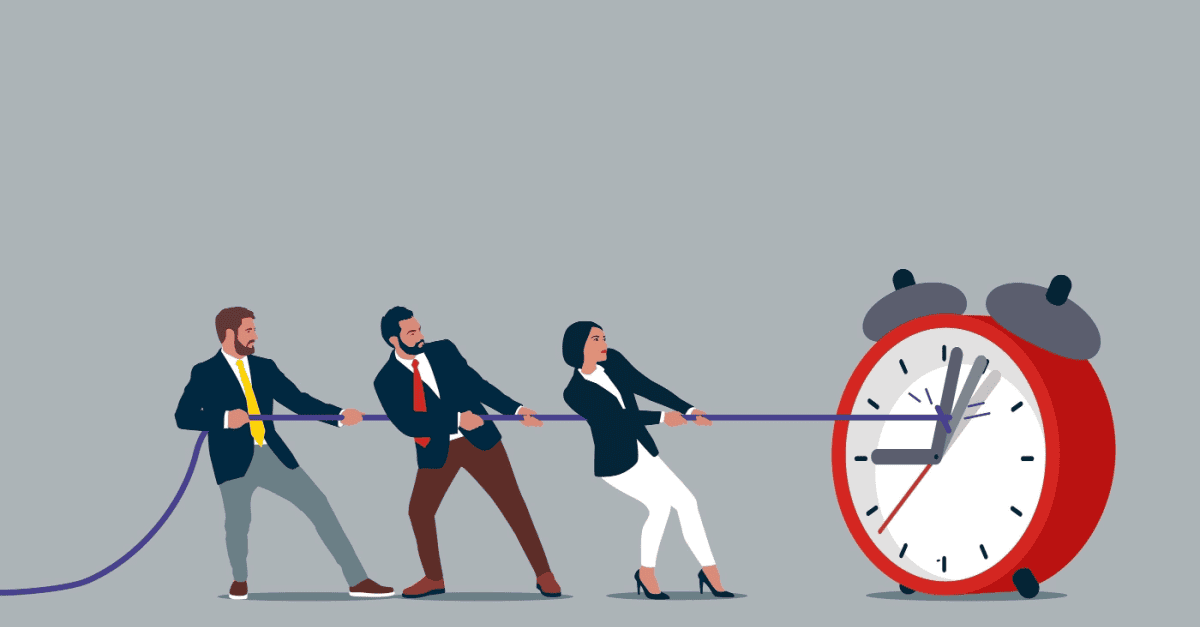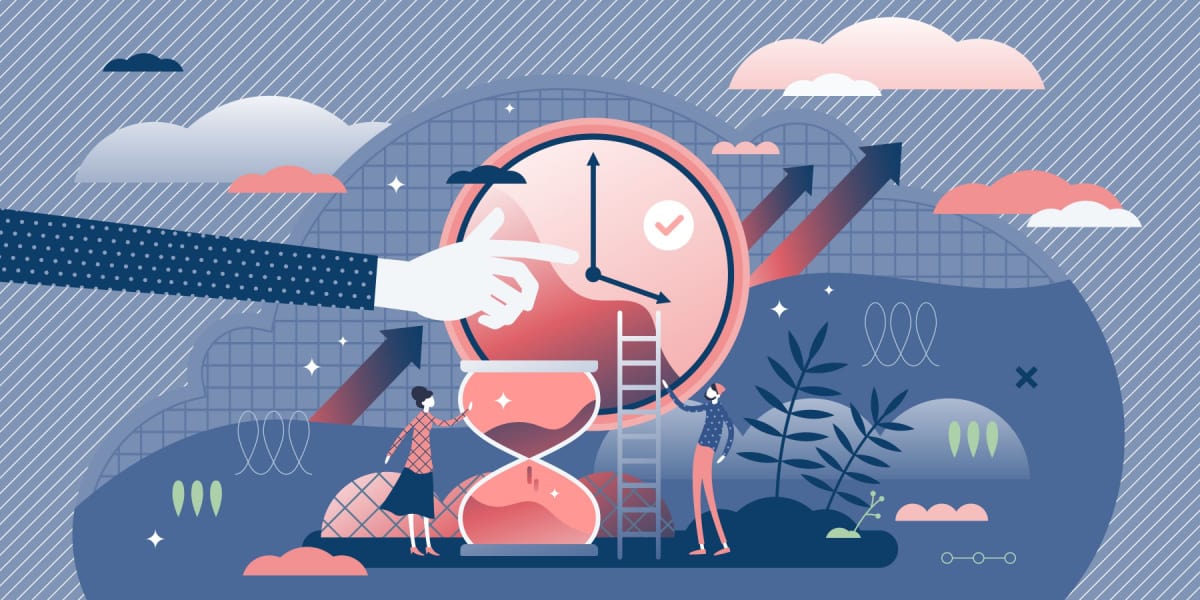
The Real Costs of Burnout and Sleep Debt
Written By: Jeff Kahn
Keep Burnout At Bay
Especially now, burnout threatens the best of sales teams. Fight it by focusing on recovery, not on hours worked.
How can team leaders keep burnout from closing in?
Of all the words that strike fear into the heart of a sales leader, “burnout” may be the most dreaded. Burnout is a real and serious risk at any job, but the constant pressures and quotas of selling make it loom especially large in the sales world.
Now, as more people work from home than ever, the risk of burnout is climbing. The line between being at work and being off the clock has blurred. Employees must simultaneously juggle the commitments of life, family, and business in a single space.
It’s a question with a multifaceted answer, but the first step is to prioritize your team’s wellbeing by focusing on their sleep. More than the stresses of work, sleep loss spells inevitable burnout for your employees.
But prescribing better sleep hygiene is only the beginning. For lasting change, you’ll need to fundamentally reframe how your team thinks about the significance of sleep and the structure of their days. As their leader, you should also adopt this new framework yourself—thereby becoming a guide to keeping burnout at bay.
The Number-One Cause of Burnout Isn’t Stress, It’s Sleep Loss
Burnout is more than being tired or listless at work. It’s a state of prolonged exhaustion that affects all of your faculties: mental, emotional, and physical. Research states that it’s most commonly associated with chronic stress, which can be work- or life-related.
The 11th Revision of the International Classification of Diseases classifies burnout as an occupational phenomenon with three distinct aspects: “feelings of energy depletion or exhaustion; increased mental distance from one’s job, or feelings of negativism or cynicism related to one’s job; and reduced professional efficacy.”
Put simply, being burnt out means you’re running on empty across the board. You can’t muster the cognitive energy to do your job well, the emotional energy to feel positive, or the physical energy to reinvigorate your body. Often accompanying this exhaustion is a sense of deep shame—you want to pull yourself out of the rut, and you blame yourself for your inability to do so.
If You’re Burnt Out, You’re Not Sleeping Enough
Burnout is a complex state, and research has identified a variety of causes behind it. Long-term stress has been the most popular explanation in the scientific literature, and it can be split into many distinct stressors, including but not limited to: high work demands, low levels of authority at work, lack of support at work, job insecurity, and an inability to mentally let go of work during off-hours.
However, the latest studies have found a causal link between sleep loss and burnout—one that appears to be even stronger than the stress-burnout connection. One such study monitored burnt out employees for two years, gauging their stress, sleep habits, and burnout severity through regular clinical assessments.
The researchers found that “too little sleep” (in this case, less than 6 hours of sleep per night) was the primary determinant of clinical burnout. Although “work demands” and “thoughts of work during leisure time” also contributed to burnout, they had less of an impact than sleep deprivation.
Other studies have backed the strong relationship between sleep loss and burnout. For example, we now know that insomnia recursively encourages the development and exacerbation of burnout, and vice versa.
Thankfully, research also indicates that the connection works both ways: reducing fatigue through sleep is a surefire way to fight back against burnout, and “the best predictor of return to work” for burnt out employees.
These findings may make it seem like the antidote to burnout is close at hand. But like any complex problem, burnout doesn’t have a simple answer. To truly stave off burnout, your employees need to look at sleep and their daily schedules through a new lens.
The Costs of Burnout
The experience of burnout is obviously a trying one for any employee. It doesn’t help that burnout can be self-perpetuating, as many efforts to combat it—working more hours, or pushing yourself to complete tasks for which you don’t have the energy—just make it worse.
Burnout also has tremendous repercussions for employers. It’s estimated to cost businesses between $125 billion and $190 billion a year in healthcare expenses. Additionally, a Gallup report showed that burnt out and “actively disengaged” employees are costing their employers 34% of their individual salaries due to their poor performance.
And that’s only the employees who stay. According to a 2016 study conducted by Kronos and Future Workplace, 95% of HR leaders agree that burnout plays a crucial role in employee turnover. In fact, it can account for 20%–50% of the turnover that occurs at a given business.
Left untreated, burnout can lead to and worsen serious health conditions. It’s such an insidious force that it’s associated with more than 120,000 deaths each year—deaths that, as this paper claims, could potentially be prevented if businesses altered their management styles.
The Risk of Burnout is at an All-Time High
Before the COVID-19 pandemic, burnout was a risk at any office. American corporate culture equates success with visible drive and quantifiable working hours. As such, burnout consumed many star employees as they strove to distinguish themselves from their peers.
Now, however, with approximately 60% of the workforce working from home, burnout has become an even bigger threat. This fact may seem counterintuitive at first. Employees have less rigid schedules and more time to complete their work—shouldn’t they be more relaxed?
The Energy Crisis
Burnout does not result from a time-based problem, but an energy-based one. Working from home conflates our work lives and our home lives, combining the stresses of each into a constant stream of responsibilities vying for our attention. The “always on” mentality has become far more literal: when your home is your office, you’re never actually off the clock.
You don’t have your commute, your dress code, or in-person meetings to preserve the ordinary boundaries between professional zones and relaxation. And perhaps most significantly, the internet is always available, pinging you with unanswered emails, to-do items, and the siren song of social media.
As digital anthropologist and author Rahaf Harfoush put it, “When you combine our culture of chronic overwork with the distraction inherent to technology… this puts people on a fast-track to burnout.” Our energy reserves are getting drained from all directions.
Sales Teams Need to Rethink Sleep
Telling your team to sleep more can be helpful, but it’s a bandage, not a cure. For salespeople, optimal wellbeing and productivity can only happen when they achieve a deeper understanding of how sleep affects every aspect of their lives. Start with these four primary lessons.
Recovery is Essential to Productivity
Many employees adopt an “I’ll sleep when I’m dead” mentality at work. They think that more time awake will yield better results. This philosophy is misguided, however. For optimum productivity, your brain and body need regular, sustained periods of rest.
When you sleep, your brain conducts a multitude of intricate processes that ready you for the next day. It consolidates memory, solidifies information you’ve learned, and rebuilds your emotional fortitude, among other tasks. Without this recharging period, you’ll have a stark disadvantage compared to colleagues who got the sleep they needed.
The same is true of anyone who’s trying to build muscle in the gym. After each workout, the body literally requires sleep to kickstart tissue repair and muscle growth. Whether you’re trying to hit a sales goal or up the number of plates on your barbell, recovery isn’t a luxury, or a sign of laziness. It’s just as necessary to self-improvement as exerting effort.
It can be tough to push back against the dominant mode of thought in corporate culture. But a cultural shift around sleep— and even workplace napping —is taking place. Companies in the know have begun to acknowledge what experts like Harfoush have been saying for years: “”If you’re a high performer and recovery isn’t an intentional and strategic part of your time and workflow, you’re only damaging your output in the long run.”
Sleep Debt Is the #1 Sales KPI
Sleep lays the groundwork for everything you do while awake. Its impact on how you function can spell the difference between success and failure at any job. That said, sleep particularly effects sales work, as it entails a unique and demanding mix of cognitive, emotional, and social skills.
Every one of us has an innate sleep need, with the average hovering around 8 hours or so. Our brains shoot for this amount of sleep to optimize how we perform during the day. Research shows that meeting your sleep need each night is a reliable predictor of every aspect of performant selling, from creativity to goal-setting.
If you’re consistently sleeping less than this amount, then you’re racking up sleep debt. You can measure sleep debt by the amount of sleep you owe yourself, relative to your sleep need, over the past two weeks.
Unfortunately, sleep debt hits sellers hard in the area of the brain they need most: the prefrontal cortex, which controls planning, organization, and other executive functioning abilities. Salespeople carrying sleep debt are therefore notably less productive, less sociable, and less able to lead.
On the other hand, making up sleep debt quantifiably raises sales success. After sellers at a Fortune 200 company used Rise to minimize their sleep debt over a period of 8 months, they reported a 14% increase in monthly revenue and a 50% increase in outbound sales calls.
Your Team Is Likely Underslept and Underperforming Already
If you think your team is safe from sleep debt and its consequences, including burnout … think again. First of all, approximately 70% of Americans admit that they’re sleep-deprived. Secondly, humans are experts at downplaying (or ignoring!) the effects of sleep debt. We’re bad at calculating our own sleep durations, and tend to overestimate how much time we spend asleep.
Sleep-deprived people also don’t have an accurate perception of their performance. They think that they’re operating as normal, or even better than normal, when really their cognitive skills have taken a measurable dive.
Over time, they acclimate to the effects of sleep loss, unaware that they’re adjusting to lower and lower standards for their work. They feel as though all is well, but their track records show a different story.
Improving Sleep Hygiene Requires a Holistic, Long-Term Approach
Sleep debt tracks the sleep you owe over two weeks, not just the last night or two. Its cumulative, chronic nature means that you carry it with you until you pay it back—it doesn’t fade away on its own.
The good news is, one night of awful sleep won’t have the same impact as many nights. If you’re sleeping well otherwise, you can offset that sleep debt easily. Likewise, one night of deep, sustained sleep won’t mitigate a heavy sleep debt load alone. To address it, you need to think long-term.
You also need to think holistically, which means restructuring your days as well as your nights. Your sleep hygiene refers to the set of behaviors that have an influence on your sleep. Many of these behaviors occur during waking hours, such as scheduling a wind-down period every evening.
Download our FREE Sales Manager’s Ultimate Interview Guide to find out how to achieve excellence in sourcing, recruiting, hiring, and retaining top sales talent in order to maintain long term sales success.
About the author
Jeff Kahn
Jeff Kahn is Co-Founder and CEO at Rise Science. Rise works with sales organizations to…
Get FREE Sales Training Delivered to Your Inbox
Join more than 360,000 professionals who get our weekly newsletter.
Related Articles

Learn Online
Self-paced courses from the
world's top sales experts

Virtual Training
Live, interactive instruction in small
groups with master trainers

Coaching
One-to-one personalized coaching
focused on your unique situation






